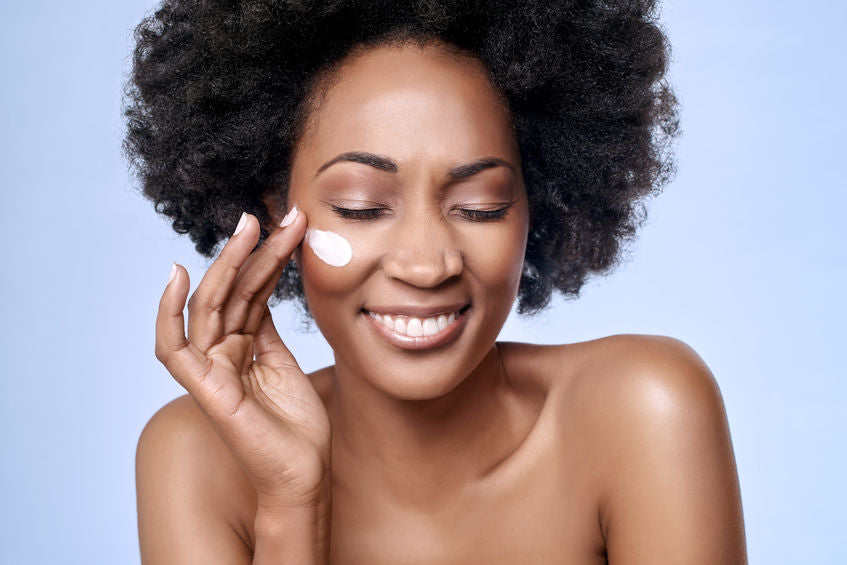Do you really need an oil-free moisturizer?

This is a common question people have when seeking out a new facial moisturizer, especially those who have oily or combination skin. Back before people became more ingredients savvy, they heeded the advice "If you have oily skin, you have to choose oil-free products."
The truth, however, is that "oil-free" is a marketing gimmick. There is no regulation or standard when it comes using this claim in personal care products. Interpretation of "oil-free" often varies by brand. In the strictest sense, a true "oil-free" product would not contain any butters, oils or waxes. Some brands label a product "oil-free" if it doesn't contain ingredients with oil in the name.
"Oil" can be a scary word for those with oily skin or breakout-prone skin. However, there are many oils that actually help balance sebum or can actually inhibit acne flare ups. Examples of these would be squalane, rosehip oil, jojoba oil, and argan oil. There is a misconception that all oils should be avoided or that they will clog your pores and this simply is not true.
I had a friend not long ago who bought an oil-free moisturizer and it made her skin more oily and she developed pimples on her chin. She asked me to take a look at the ingredients label to figure out what was going on. Her moisturizer contained dimethicone and petrolatum, both of which are common culprits in terms of clogging the pores.
In fact, New York dermatologist Dr. Neil Sadick says to “steer clear of clogging ingredients like petroleum, mineral oil or silicones like dimethicone...or artificial fragrances [which] are also a no-no as they are irritants and trigger inflammation and flare ups.” All of the above are commonly found in "oil-free" products.
Is your skin oily? Consider Seed Daily Facial Moisturizer with natural ingredients to soothe and soften the skin as it helps balance sebum production, thanks to the jojoba oil and niacinamide.
Leave a comment
Comments will be approved before showing up.
Also in Lately I've been paying more attention

5 Skin Care Benefits of Black Cumin Seed Oil
Black Cumin Seed Oil is an ingredient used in skin care that is unfamiliar to many. We like to think of it as an unsung hero. Just what is Black Cumin Seed Oil and why is it so beneficial for the skin?
Let's learn more:
Black Cumin Seed Oil, or Nigella sativa, is rich in history. Used in skin care for thousands of years, it is believed that both Cleopatra and Nefertiti used the seeds in their bath water. In fact, it is said that this ingredient has been used by royalty as a natural skin care remedy for over 4000 years!
Black Cumin Seed Oil is an elixir for red and irritated skin. Known for its anti-inflammatory and antibacterial benefits, Black Cumin Seed Oil is a magical skin care oil that can be used on every skin type.

5 Back to School Skin Care Tips for College Students
College students, let us help you establish a healthy skin care and wellness routine.
....
We've all heard about the "Freshman 15." I gained about 7 pounds freshman year. I can tell you that I had many choices in the dining hall, but my mom wasn't there to make sure I ate my fruits and veggies. I loaded up on macaroni and cheese and mashed potatoes. I drank soda pop instead of water. I made Pop Tarts in my dorm room and ordered pizza regularly. Eat as many fresh, whole foods as you can and drink lots of water. Your skin will benefit from this. I recommend eating lots of

10 Skin Care Benefits of Niacinamide
If you are on the quest for healthy looking skin, this ingredient needs to be in your skin care arsenal.
Niacinamide, or Vitamin B3 (also called Nicotinic Acid) offers multiple benefits to the skin. It can help to visibly diminish the appearance of large pores, fine lines, skin dullness, and also helps to even out skin tone.
There is solid research supporting the benefits of Niacinamide.This skin vitamin is one that truly benefits nearly every skin type. Other recent research published by the editors of the Melanoma Letter suggests that niacinamide "can significantly reduce recurrences of actinic keratosis, basal cell carcinoma and squamous cell carcinoma in patients with a history of these lesions."



